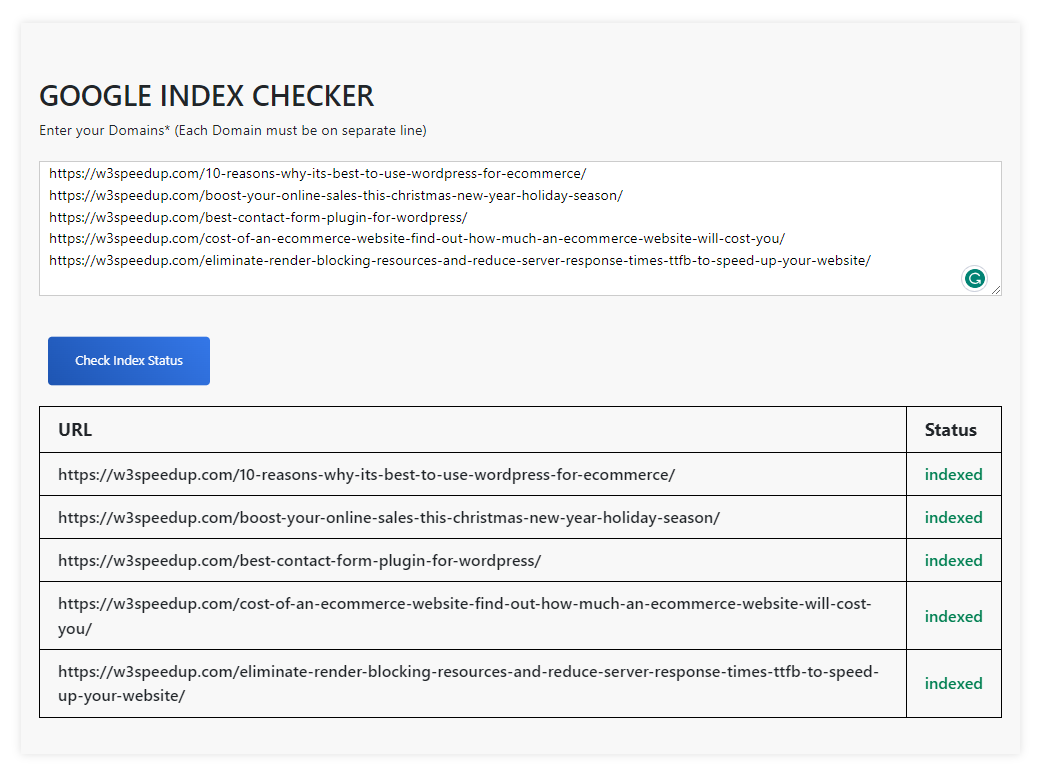Google Index Checker
⯁ Boost Your SEO: Streamline Website Indexing with Bulk Index Checker
In the exhilarating arena of the digital realm, where fortunes are won and lost, Search Engine Optimization (SEO) emerges as the undisputed champion. To conquer the fierce online competition, one must wield the power of SEO techniques, scaling the heights of SERPs. Unveiling a secret weapon, the enigmatic Google Index Checker, an oracle of website indexing. Brace yourself for a thrilling journey through the value of indexing, an exploration of the mighty bulk index checker’s advantages, and invaluable advice on turbocharging your website’s indexing process. Embrace this epic quest and discover the tool that holds the key to your online triumph.
⯁ Understanding Website Indexing
Before we dive into the details of a Google Index Checker, let’s first understand what website indexing entails. In simple terms, Website indexing is a fundamental process in search engine optimization (SEO). It involves search engines like Google systematically discovering, crawling, and analyzing web pages to include them in their vast database. The purpose of indexing is to make web pages eligible to appear in search engine results when users enter relevant queries.
When search engines indexes a web page, it essentially adds it to its collection of web documents, making it accessible to users when they search for related keywords. The indexing process involves search engine bots, also known as spiders or crawlers, visiting web pages, following links, and gathering information about each page’s content, structure, and relevance.
Search engines then use the information collected during indexing to determine the ranking and visibility of web pages in search results. Factors such as content quality, relevance, user experience, and authoritative backlinks are considered when search engines evaluate and rank web pages.
⯁ The Significance of Fast Website Indexing
Fast website indexing is crucial for several reasons. Firstly, it ensures that your content is promptly made available to search engine users. When you publish new content or update existing pages, you want search engines to discover, index & then quickly check if URL is indexed in Google. This enables your target audience to find and engage with your content promptly.
Furthermore, timely indexing allows search engines to evaluate your web pages’ relevance and quality accurately. The sooner your pages are indexed, the sooner search engines can analyze and rank them based on their algorithms. This can directly impact your search engine rankings, visibility, and organic traffic.
By having your web pages indexed efficiently, you increase the likelihood of attracting organic traffic from users searching for relevant keywords. Indexed pages are more likely to appear in search results, increasing the chances of users clicking through to your website. This can improve brand visibility, and increase website traffic and potential conversions or sales.
To ensure effective website indexing, it’s crucial to create high-quality and engaging content, optimize on-page elements such as meta tags and headings, build authoritative backlinks, and address any indexing issues promptly. Regularly monitoring your website’s indexing status using tools like Google Index Checkers allows you to identify and resolve any problems hindering the indexing process.
⯁ Introducing Bulk Index Checker

Our free Google Index Checker tool offers a hassle-free solution for checking the indexing status of multiple URLs. You can conveniently assess whether Google indexes each URL with a simple paste. Our tool handles everything, whether you have a few URLs or a long list to verify. Stay informed about the visibility of your web pages in Google’s index and make data-driven decisions to improve your online presence. Experience the convenience of our Google Index Checker today and easily optimize your website’s performance.
⯁ Benefits of Using a Bulk Index Checker
-
- Time Efficiency: Utilizing a Bulk or Google indexed pages checker saves precious time that can be better spent on other aspects of your SEO strategy. Instead of manually checking each page, you can input the URLs and let the tool generate a detailed report on the indexing status of all your web pages.
-
- Comprehensive Analysis: A reliable Bulk or Google-indexed pages checker informs you about the indexed or non-indexed status of your web pages and provides detailed information about potential indexing issues. It can highlight pages with duplicate content, broken links, or crawl errors, enabling you to address these issues promptly and enhance your website’s overall indexing performance.
-
- Rapid Problem Identification: In the vast sea of web pages, it can be challenging to identify which pages are causing indexing issues. A Bulk or Google-indexed pages checker simplifies this process by presenting a comprehensive overview of your website’s indexing status. By quickly identifying problematic pages, you can take immediate action to rectify any indexing-related problems.
-
- Optimization Opportunities: By using a Bulk or google indexed pages checker, you gain valuable insights into the indexing patterns of your web pages. This knowledge allows you to optimize your website’s structure, content, and technical elements to align with search engine guidelines and increase your chances of ranking higher in SERPs.
-
- Enhanced Visibility in Search Engine Results: When your web pages are correctly indexed, they have a greater chance of coming in search engine results for relevant queries. This increased visibility exposes your content to a broader audience and improves the likelihood of attracting organic traffic.
-
- Improved Organic Traffic and User Engagement: Proper indexing enables search engine users to find and access your web pages when they search for related keywords. As a result, you can experience an increase in organic traffic as more users discover and visit your website. Higher levels of user engagement, such as longer visit durations and lower bounce rates, can also be expected when users find the content they were searching for.
-
- Increased Credibility and Trust: Indexing and displaying your web pages in search engine results adds to your website’s credibility and authority. Users tend to trust websites that appear in search results, as it indicates that the search engine has recognized the relevance and quality of the content. This increased credibility can lead to higher user trust, repeat visits, and improved conversion rates.
-
- Better User Experience: Efficient indexing contributes to a better user experience by ensuring users can easily find the information they seek. When search engines index your web pages accurately and promptly, users are more likely to have a positive experience on your website. This can result in increased user satisfaction, improved engagement metrics, and a higher likelihood of users returning to your site.
-
- Competitive Advantage: Effective website indexing gives you an edge online. When your web pages are indexed faster and more comprehensively than your competitors, you can rank higher in search results. This can lead to increased visibility, greater brand exposure, and a larger share of organic traffic within your industry or niche.
-
- Efficient Content Marketing: Proper indexing allows you to align your content marketing efforts with search engine guidelines and algorithms. Ensuring that your content is promptly indexed, you can effectively strategize and time your content releases. This ensures that your valuable content is available to users when needed, helping you build authority, attract backlinks, and establish thought leadership in your industry.
-
- Data Insights for Optimization: Bulk Index Checkers provide valuable insights and data about your website’s indexing status. This information can be used to identify trends, patterns, and potential issues that may be hindering the indexing process. By analyzing the data of your website, you can make informed decisions to optimize your website’s structure, content, and technical aspects for improved indexing performance.
⯁ Best Practices for Lightning-Fast Website Indexing
Now that we understand the significance of website indexing and the benefits of using a Bulk Index Checker let’s explore some best practices to supercharge your SEO efforts:
-
- Create High-Quality and Engaging Content: Content quality is paramount in SEO. Craft well-researched, informative, and engaging content that resonates with your target audience. By offering value through your content, you increase the likelihood of attracting organic backlinks, which are vital for indexing and ranking purposes.
-
- Optimize On-Page Elements:
-
-
-
- Pay attention to on-page SEO elements such as meta tags, headings, and keyword optimization.
- Ensure that your meta titles and descriptions accurately represent the content on each page, and incorporate relevant keywords naturally throughout your content.
- Use appropriate header tags (h1, h2, h3, etc.) to structure your content and improve readability.
-
-
-
- Build High-Quality Backlinks: Backlinks are a vote of confidence for your website’s credibility and authority. Focus on acquiring backlinks from reputable sources within your industry. Engage in guest blogging, influencer collaborations, and content promotion to attract quality backlinks. A Bulk or Google Index Checker can help you track the indexation of the pages containing your backlinks.
-
- Monitor and Fix Indexing Issues: Regularly monitor your website’s indexing status using a Bulk Index Checker. Address indexing issues promptly, such as pages blocked by robots.txt, duplicate content, or crawl errors. Resolving these issues ensures that search engines can easily access and evaluate your web pages.
-
- Optimize Website Speed: Website loading speed is critical to user experience and search engine rankings. Optimize your website’s speed by compressing images, minifying CSS & JavaScript files, and leveraging browser caching. A fast-loading website not only enhances user satisfaction but also improves the efficiency of search engine crawlers.
-
- Leverage Schema Markup: Implementing schema markup can provide search engines additional context about your website’s content. By utilizing schema markup, you can enhance the visibility of your web-pages in search engine results with rich snippets, which can lead to higher click-through rates and improved indexing.
-
- Regularly Update and Refresh Content: Search engines favor fresh and up-to-date content. Regularly review & update your existing content to ensure its relevance and accuracy. Consider repurposing old content into new formats, such as infographics or videos, to attract more attention and increase its indexation potential.
-
- Monitor Indexing Performance Metrics: Keep track of crucial indexing performance metrics such as crawl rate, indexed pages, and crawl errors. This data will provide valuable insights into the health of your website’s indexation. Identify trends and patterns to make data-driven decisions and optimize your SEO strategy accordingly.
-
- XML Sitemap: Create and submit an XML sitemap to search engines. This file provides a roadmap of all the pages on your website, helping search engines understand its structure and content. Regularly update and submit your sitemap to ensure new pages are indexed promptly.
-
- Mobile-Friendly Design: With the increasing use of mobile devices, it’s crucial to have a responsive and mobile-friendly website design. Mobile-friendly websites provide a better user experience but also receive preferential treatment from search engines, potentially leading to better indexing and rankings.
-
- Canonical URLs: Implement canonical tags to prevent duplicate content issues. Canonical tags inform search engines which version of a webpage is the preferred or original, consolidating the indexing signals and preventing potential penalties for duplicate content.
-
- Structured Data Markup: Utilize structured data markup, such as Schema.org, to provide search engines with additional information about your web pages. Structured data helps the search engines to understand the context & meaning of your content, potentially leading to enhanced search engine results with rich snippets and other interactive elements.
-
- URL Structure: Create clean, descriptive, and keyword-rich URLs for your web pages. A well-structured URL can help search engines to understand the content & relevance of a page. Avoid using dynamic parameters or excessively long URLs, as they can be challenging for search engines to crawl and index.
-
- Internal Linking: Incorporate internal links within your website to establish a clear and logical site structure. Internal links help search engines discover and navigate your web pages, improving their indexation. Additionally, internal linking helps distribute authority and relevance throughout your website, enhancing the visibility of important pages.
⯁ Conclusion
In the competitive realm of SEO, leveraging practical tools like Bulk Index Checkers can give you a significant advantage. By understanding the importance of fast website indexing and utilizing our reliable Bulk Index Checker, you can streamline your SEO efforts and enhance your website’s visibility in search engine results. Remember to consistently create high-quality content, optimize on-page elements, build authoritative backlinks, monitor and resolve indexing issues, and implement other best practices outlined in this content. By implementing these precise strategies, you can supercharge your SEO efforts and propel your website to new heights in Google’s search rankings.
 Sitemap Page Counter
Sitemap Page Counter Broken Link Checker
Broken Link Checker Word Counter
Word Counter AdSense Revenue Calculator
AdSense Revenue Calculator QR Code Generator
QR Code Generator More Tools
More Tools
